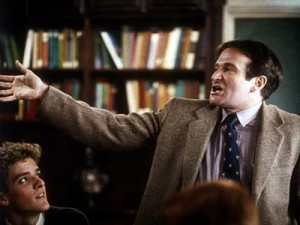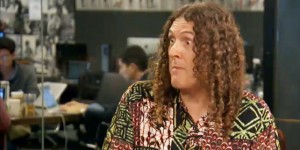TGIF. In language and usage news this fortnight: a school that teaches in Manx Gaelic; an emergency poet; costly slips of the tongue; zombie nouns; an ominous auto-correct error; punctuation problems in a pre-K campaign; and can Benedict Cumberbatch not say penguin? Continue reading
Category Archives: Poems, prose & song
What good amid these, O me, O life?
“We don’t read and write poetry because it’s cute. We read and write poetry because we’re members of the human race. And the human race is filled with passion. Medicine, law, business, engineering; these are noble pursuits and necessary to sustain life. But poetry, beauty, romance, love: these are what we stay alive for. To quote from Whitman:
“Oh me! Oh life! of the questions of these recurring. Of the endless trains of the faithless, of cities fill’d with the foolish. What good amid these, O me, O life? Answer. That you are here — that life exists and identity, That the powerful play goes on, and you may contribute a verse.”
What will your verse be?”
Robin Williams in Dead Poet Society, written by Tom Schulman.
O Me! O Life!
Oh me! Oh life! of the questions of these recurring,
Continue reading
For the Fallen, by Laurence Binyon
Marking the 100th anniversary of the outbreak of the First World War.
28 July, 2014
For the Fallen
With proud thanksgiving, a mother for her children,
England mourns for her dead across the sea.
Continue reading
Weird Al gets it
It’s weird but true: “Weird Al” Yankovic actually gets grammar.
To promote his new album, Mandatory Fun, Weird Al is releasing a new video every day for each of the tracks on the CD. Today’s video is the song “Word Crimes” — a take-off of Robin Thicke’s “Blurred Lines”. It’s music to the ears of us grammar nerds.
“I hate these word crimes / Like ‘I could care less’ / That means you DO care”
“I don’t want your drama / If you really wanna / Leave out that Oxford comma”
And if you can’t stop committing these word crimes, then Al suggests that “you should hire / some cunning linguist / who can help you distinguish / what’s proper English …”
Anyone who understands the difference between less and fewer and that irony is not coincidence (yes, he manages to slip both those words crimes in) is a man after my own heart.
Knock yourself out, Glossophiles, and sing along with Al …
Hat-tip to Lil …
To be twee, or not to be twee
On June 3, Marc Spitz’s new book, Twee: The Gentle Revolution in Music, Books, Television, Fashion and Film was published by IT Books/Harper Collins.
But hang on a minute: what does twee actually mean? An adjective with slightly onomatopoeic and diminutive implications — originally thought to represent a childish pronunciation of sweet, its straightforward meaning according to the OED is sweet, dainty or chic; but this British colloquialism has a distinctively derogatory flavor — one that smacks of more affectedly and repellently quaint: precious or overly saccharine, rather than simply sweet.
The Telegraph in summing up Philippe Le Guay’s movie Cycling with Moliere declares that “twee groanishness abounds”. An English reader gets exactly what that means, even if we haven’t seen the film in question: we’re unlikely to pay the cost of admission and candied popcorn if we’re in for an evening of groanish twee. But have Americans taken that quaint 4-letter word and taken it too far — or gone slightly off course in their understanding of it? Continue reading
Solstice, or sunstead
June 21st: the summer solstice.
One of two days in the year when the sun is furthest from the celestial equator, and so the difference in length between night and day is at its greatest: 21st June is the longest day of the year, 21st December the shortest. (But because the duration of the earth’s orbit around the sun is slightly longer than the 365-day calendar, those dates can vary.)
On this winter day the sun appears at its lowest point in the sky, and its noontime elevation appears to”stop” in the sky and stay the same for several days before and after the solstice, and so the word finds its origins. Dating back to the mid-13th century, solstice is from the Latin solstitium — “the point at which the sun seems to stand still” — from sol, “sun”, stitium, “a stoppage”, and sistere, “to stand still”. In very early use, the word came into English as sunstead (or, in late Old English, sunstede).
* * *
TGIF: That Gerund Is Funky (June 15)
A couple of days late this week, That Gerund Is Funky looks at words and punctuation in the news: two stories out of Cambridge – about bad spelling and wordless poetry; the role of the exclamation mark; has poetry become irrelevant?; and some extinct slang.
“A Poet” by Thomas Hardy (2 June 1840 – 11 January 1928)
Happy Birthday, Thomas Hardy.
A Poet
Attentive eyes, fantastic heed,
Assessing minds, he does not need,
Nor urgent writs to sup or dine,
Nor pledges in the roseate wine.
For loud acclaim he does not care
By the august or rich or fair,
Nor for smart pilgrims from afar,
Curious on where his hauntings are.
But soon or later, when you hear
That he has doffed this wrinkled gear,
Some evening, at the first star-ray,
Come to his graveside, pause and say:
‘Whatever his message his to tell
Two thoughtful women loved him well.’
Stand and say that amid the dim:
It will be praise enough for him.
— Thomas Hardy (2 June 1840 – 11 January 1928)
Poetry in Motion: From “Love in the Ruins” by Jim Moore
In the news (May 30)
 Why punctuation matters (Somewhere in America, Memorial Day, May 26)
Why punctuation matters (Somewhere in America, Memorial Day, May 26)
TGIF: Language in the news and on the web this week includes a spelling bee tie, a poetic birthday celebration in Siberia; some words that mean the opposite of themselves; some foreign words that are untranslatable; voting words into the dictionary; a very fashionable pronunciation guide; and a war against euphemism and cliche.
* * *
Two boys won this year’s National Scripps Spelling Bee. As CBS News reported, “Sriram Hathwar of Painted Post, New York, and Ansun Sujoe of Fort Worth, Texas, shared the title after a riveting final-round duel in which they nearly exhausted the 25 designated championship words. After they spelled a dozen words correctly in a row, they both were named champions.”
* * *
To mark the 215th anniversary of the birth of Alexander Pushkin on June 6, one of Russia’s greatest poets, the Siberian city Novosibirsk is going to offer free rides on its underground to anyone who can recite at least two verses from any of his Pushkin’s poems. The BBC reports on this poetic event.
* * *
Here’s one of the reasons I love mental_floss: today it gives us 25 words that are their own opposites – otherwise known as contronyms. “Because of the agency’s oversight, the corporation’s behavior was sanctioned.” Confused? Yeah … That’s what contranyms can do. (And even contranym doesn’t know how to spell itself, let alone decide what it means.)
* * *
Do you think adorkable or duckface should be legitimate, dictionary-worthy words? Well, if you feel strongly enough either way, you can have your say. According to a report in The Economist, Collins Dictionary is going to add a word to its dictionary based on votes collected through Twitter.
* * *
Is your inability to pronounce designers’ names making your life a misery? If so, Harper’s Bazaar has come to the rescue, publishing an A-Z cheat sheet to help you tackle Moschino, Hermes, Miu Miu, Lanvin and more. You never need be embarrassed again when getting your fashion lingo on …
* * *
Bored Panda brings us 30 untranslatable words from other languages – with some attractive illustrations by Anjana Iyer. This picture captures the meaning of the Japanese word bakku-shan, for example, in a way that the English language simply can’t.
Anjana Iyer, from Bored Panda
* * *
Ending on a serious note this week, Adam Gopnik in the New Yorker wrote movingly about the need to speak clearly and directly when conveying hard truths. Commenting after the recent California shooting, Gopnik commended the father of one of the victims for doing just this. “The war against euphemism and cliché matters not because we can guarantee that eliminating them will help us speak nothing but the truth but, rather, because eliminating them from our language is an act of courage that helps us get just a little closer to the truth. Clear speech takes courage.”
* * *









